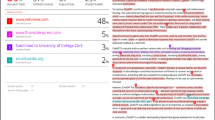Conclusion
This paper has identified a major gap in the research revolving around academic integrity/dishonesty and WBDE. Statistical evidence and empirical data are almost nonexistent. However, the evidence and data that do exist, strongly challenge many widespread assumptions related to the lack of integrity and the widespread dishonesty that are assumed to exist in WBDE today. Considering the continuing unprecedented growth of distance education, the extremely limited amount of statistical data available on this topic and the implications associated with the (possibly incorrect) assumptions of academic integrity in this environment, it seems that there is a critical need for further study. In the meantime, educational institutions can feel confident about the academic security of their WBDE programs by implementing the few safeguards suggested in this article to protect against dishonesty
Similar content being viewed by others
References
CAI Research, (n.d.). Retrieved February 8, 2004, from Duke University, Center for Academic Integrity Web site: http://www. academicintegrity.org/cai_research.asp
Carnevale, D. (1999, November 12). How to proctor from a distance [Electronic version].Chronicle of Higher Education, 46, A47.
Ercegovak, Z., Richardson, J.V. Jr. (2004, July). Academic dishonesty, plagiarism included, in the Digital Age: A literature review.College and Research Libraries, 65(4), 301–318.
Gibelman, M., Gelman, R., & Fast, J. (1999). The downside of Cyberspace: Cheating made easy.Journal of Social Work Education, 35(3), 367–376.
Hardy, D. (2002). Ethical considerations affecting teaching in community colleges: An abundance of feeling and limited fact.Community College Journal of Research and Practice, 26(5), 383–399.
Heberling, M. (2002, Spring). Maintaining academic integrity in online education.Online Journal of Distance Learning Administration, 5(1). Retrieved February 8, 2004, from http://www.westga. edu/%7Edistance/ojdla/spring5l/heberling51.html
Kennedy, K., Nowak, S., Thomas, J., & Davis, S. (2000, June). Academic dishonesty and distance learning: Student and faculty views.The College Student Journal, 34(2), 309.
Olt, M. (2002, Fall). Ethics and distance education: Strategies for minimizing academic dishonesty in online assessment.Online Journal of Distance Learning Administration, 5(3). Retrieved February 8, 2004, from http://www.westga.edu/%7Edistance/ ojdla/fall53/olt53.html
Ridley, D. R., Husbands, J. E. (1998). Online education: A study of academic rigor and integrity.Journal of Instructional Psychology, 25(3), 184–188.
Roach, R. (2001). Safeguarding against online cheating.Black Issues in Higher Education, 18, 92.
Shyles, L. (2002, November).Authenticating, identifying, and monitoring learners in the virtual classroom: Academic integrity in distance learning. Paper presented at the Annual Meeting of the National Communication Association, New Orleans, LA.
Weiler, M. (2002). Assessment issues on a web-based course.Assessment and Evaluation in Higher Education, 27(2), 109–116.
Rights and permissions
About this article
Cite this article
Baron, J., Crooks, S.M. Academic integrity in web based distance education. TECHTRENDS TECH TRENDS 49, 40–45 (2005). https://doi.org/10.1007/BF02773970
Published:
Issue Date:
DOI: https://doi.org/10.1007/BF02773970




